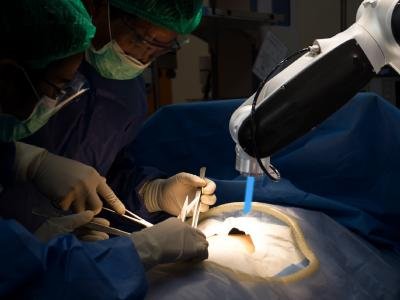Under the leadership of a surgeon of Indian origin, the first surgery was carried out through robots in the world. In this, a rare type of tumor was successfully removed from a patient's neck. Cordoma is a rare type of cancer that occurs in the scalp and spinal cord. The tumor of the chordoma very slowly develops seriously, and for several years it has no symptoms.
Noa Pernikoff, 27, of America, was injured in a car accident in 2016. After recovering from minor injuries, there was a lot of pain in his neck. After this the X-ray was made, in which there was noticeable damage in his neck. These wounds were not related to accident and they were going to create much more worry than the injury they suffered.
After that the place was biopsy. In this, the matter of being suffering from a person's cordoma came out. Parnikoff said, "I am so lucky that they have discovered it long ago. In many people it is not detected soon, and due to this early treatment can not be possible.
Surgery is the most suitable choice for cordoma treatment, but in the case of Pernikoff it was very difficult. In this way, he had the second option of proton therapy.
Cordoma is quite rare. Every year one person is influenced by one in ten million people. In the case of Pernikoff, Cordoma was in C 2 vertebra. This is even more rare and its treatment is challenging.
Parnikoff's surgery was done in August last year at University of Pennsylvania, USA. The robot was used in the second part of the surgery in three stages. The surgery team headed by assistant professor Neil Malhotra has done this surgery.
Pernikoff's surgery took place in three stages. Neurosurgeon in the first round cut the spinal cord near the tumor in the back of the patient's neck, in order to remove the tumor from the mouth in the second phase.
After the success of the first stage, through the use of surgical robot, the doctors team cleared the part of his neck from the neck so that the doctor could remove the malhotra tumor and part of the spinal cord.
In the final stage, the team fitted Pernikoff's spinal cord to its former position. Nine months after the surgery, Pernikoff returned to work.
Very good surgery for human. Science is very good ahead and increadeble progress.
Science is progressing is very good this time.